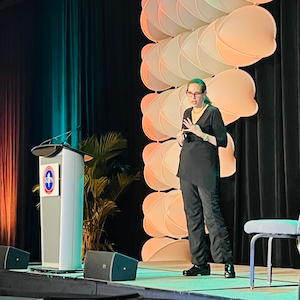Article
SDPA 2022 Presentation Highlights: Psoriasis Primer, Upcoming Biologic Therapies
Author(s):
During her SDPA 2022 presentation, Cynthia Trickett explored the topic of psoriasis, including comorbidities and treatment options.

In her presentation at the SDPA 20th Annual Fall Dermatology Conference, Cynthia Trickett, MPAS, PA-C, gave a psoriasis primer involving a discussion of therapeutic treatment options and comorbidities.
Trickett works as a physician associate for North Dallas Dermatology Associates, as well as an adjunct faculty member for the Physician Assistant Departments at the University of Texas Southwestern and the University of North Texas.
“We're going to talk about epidemiology,” she began. “We're going to talk about morphologies, comorbidities, and we're going to take a deeper dive into psoriatic arthritis. We'll review the current biologics approved for psoriasis vulgaris. We'll review the new topical therapies that are out that have worked well.”
Trickett began her presentation with a demonstration of a psoriatic arthritis exam with an audience member, before then moving on to a broader description of plaque psoriasis and its known causes in the world of dermatology.
“We know that it’s genetics plus environment,” Trickett said. “The exact cause is unknown, but we’re improving our understanding of it every day.”
Trickett described several major psoriasis statistics to the audience, including the following:
- Up to 20% of patients have moderate to severe psoriasis based on total body surface area (TBSA) only
- Up to 30% will end up developing psoriatic arthritis
- Some of the 2 main causes of psoriasis include keratinocyte hyperproliferation and hyperactivity induced by immune factors
- Some of the medications that can worsen psoriasis for patients include beta-blockers, lithium, antimalarials, blood pressure medications, biologics, interferon, NSAIDS, gold salts, and steroids
Trickett also went on to describe psoriasis comorbidities, including cardiovascular disease, psoriatic arthritis, immune-modulated diseases, metabolic syndrome, psychiatric issues, or other conditions like fatigue or lymphoma.
The discussion also included a description of upcoming topical, systemic, and biological therapies in study for psoriasis patients. An upcoming biologic for Generalized Pustular Psoriasis (GPP) is spesolimab, in study currently.
On the horizon, Trickett described several potential treatments that are in study including:
- Apremilast in pediatric patients
- Topic gene-based gels
- Topical tropomyosin-receptor kinase A inhibitor
- Topical brepocitinib
- IL 2 inhibition
- SGX302 (Phase 2)
- KD025 (Phase 2)
- Topical hydrocortisone ointment
- Abatacept
- Botox
To learn more about SDPA 2022 presentations of interest, continue following updates on conference coverage.





